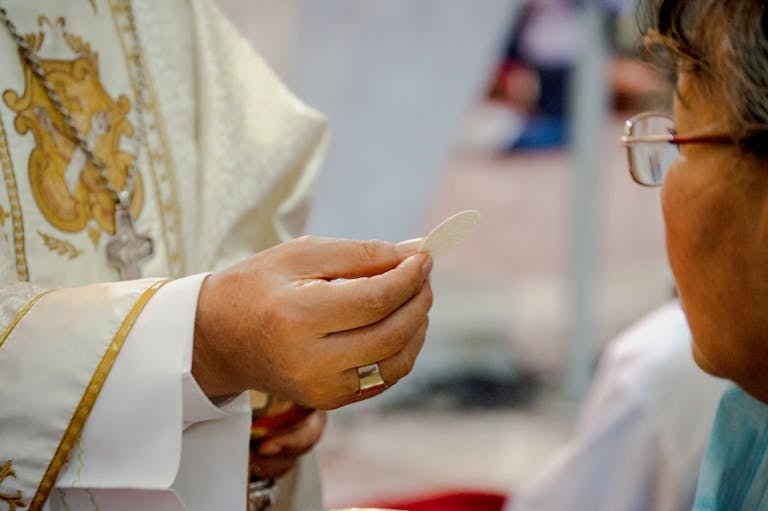Welcome to Gospel Mysteries. In this piece, I will share with you a powerful method of witnessing to Muslims—one rooted not in confrontation but in careful examination of the scriptures we share.
We tell ourselves separate stories. Different covers, different heroes, different endings. Yet when you open the pages slowly and curiously, you notice the same bright filament running from Abraham’s knife to Isaiah’s quill to Mary’s cradle. Even the Qur’an nods to it. This isn’t theology by megaphone—it’s quiet pattern-recognition. One thread, ancient and unbroken, waiting for anyone brave enough to trace it with their finger and say, “Ah, there it is.”
We both honour Abraham.
We both revere Moses, David, Isaiah, Mary, and Jesus.
So let’s start there.
This post is not about winning arguments.
It’s about following a single thread that runs through the Tawrat (Torah), the Zabur (Psalms), the Prophets, and, yes, the Qur’an.
If the same pattern keeps showing up, ignoring it feels like malpractice.
The Foundation: Common Ground
Before diving into specific claims, it’s worth establishing what both traditions affirm. Muslims and Christians agree that:
- God is one, all-powerful, and worthy of worship alone
- The prophets spoke truth from God
- Jesus (Isa) was born of a virgin
- Jesus performed miracles by God’s permission
- Jesus will return at the end of days
- The scriptures given to Moses, David, and the prophets were from God
This common ground provides a foundation for respectful dialogue. We’re not starting from scratch—we’re examining shared testimony.
Claim 1: “God has no son.”
This is perhaps the most significant point of contention. The Qur’an repeatedly denies that God has a son in the physical, biological sense. Christians wholeheartedly agree—God did not procreate. The biblical concept of “Son of God” is relational and royal, not biological.
Psalm 2: The Royal Son
“You are My Son; today I have begotten You. Ask and I will give You the nations.” (Psalm 2:7-8)
This psalm was sung at the coronation of Israel’s kings. Yet the language transcends any earthly monarch. Global inheritance. Eternal authority. Nations as a possession. Not local politics. Not metaphorical poetry. A messianic job description that no mere human could fulfill.
The Hebrew word for “begotten” here (yalad) in royal contexts means “declared” or “installed”—not physical birth. David was “begotten” as king when he was anointed, not when he was born.
Isaiah 9: A Child Called Mighty God
“For unto us a Child is born, unto us a Son is given; and the government will be upon His shoulder. And His name will be called Wonderful, Counselor, Mighty God, Everlasting Father, Prince of Peace. Of the increase of His government and peace there will be no end.” (Isaiah 9:6-7)
A child is born.
His throne lasts forever.
“Mighty God” (El Gibbor) is His name—the same title used for Yahweh in Isaiah 10:21.
If eternity belongs only to God, who is this child? If “Mighty God” applies only to the Almighty, what child bears this name?
Proverbs 30: The Mystery Deepens
“Who has ascended into heaven, or descended? Who has gathered the wind in His fists? Who has bound the waters in a garment? Who has established all the ends of the earth? What is His name, and what is His Son’s name, if you know?” (Proverbs 30:4)
Long before the New Testament, Hebrew wisdom literature asked: What is God’s Son’s name? The question assumes an answer exists.
Qur’an 4:171: Unique Titles
The Qur’an rejects any idea of God procreating physically. Christians agree completely—that’s not what “Son of God” means. Yet Surah 4:171 calls Jesus “His Word” (Kalimatullah) and “a Spirit from Him” (Ruh minhu).
No other prophet receives these titles. Not Moses. Not Abraham. Not Muhammad. Only Jesus is called God’s Word and a Spirit from God.
The Gospel of John opens: “In the beginning was the Word, and the Word was with God, and the Word was God… And the Word became flesh and dwelt among us” (John 1:1, 14).
Royal. Relational. Eternal.
Exactly what Psalm 2 and Isaiah 9 predicted.
Key thought:
The Bible’s “Son” is a status, not biology. It speaks of relationship, not reproduction. Once that’s clear, the prophetic puzzle pieces click.
Claim 2: “Jesus did not die on the cross.”
This claim, based on Qur’an 4:157, is often understood to mean Jesus was never crucified at all. But careful examination of both the Hebrew prophets and the Qur’an itself reveals a more complex picture.
Three Hebrew Witnesses
Centuries before crucifixion was invented by the Persians and perfected by the Romans, Hebrew prophets described it in haunting detail:
Psalm 22 (written by David, ~1000 BC):
- “They pierced my hands and my feet” (v. 16)
- “They divide my garments among them, and for my clothing they cast lots” (v. 18)
- “All my bones are out of joint” (v. 14)—describing the dislocation caused by hanging
- “My tongue clings to my jaws” (v. 15)—the dehydration of crucifixion
Isaiah 53 (written ~700 BC):
- “He was wounded for our transgressions” (v. 5)
- “He was cut off from the land of the living” (v. 8)
- “They made his grave with the wicked” (v. 9)
- “He shall see His seed, He shall prolong His days” (v. 10)—death followed by continued life
Zechariah 12:10 (written ~500 BC):
“Then they will look on Me whom they have pierced.” The speaker is Yahweh Himself, saying He will be pierced. A mystery wrapped in vulnerability.
Crucifixion pictured centuries before Rome brought it to Judea.
Death foretold. Resurrection implied.
Qur’an 4:157: What the Text Actually Says
The verse records a boast from Jesus’ enemies: “We killed the Messiah, Jesus son of Mary, the messenger of Allah.”
The reply: “They killed him not nor crucified him, but it appeared so to them.”
Read carefully: the denial targets the conspirators’ boast—their claim to have defeated God’s messenger. It denies their victory, not necessarily the historical event. The enemies did not succeed in defeating Jesus; God vindicated Him.
It does not say God prevented Jesus from dying. It says the enemies’ perception of triumph was false.
Qur’an 19:33: Jesus Speaks
In Surah Maryam, Jesus speaks from the cradle:
“Peace on me the day I was born, the day I die, and the day I am raised alive.”
Birth. Death. Resurrection.
Three events. Clear sequence.
Exactly Isaiah 53’s pattern.
If Jesus never died, this verse loses its meaning. Why would God grant Jesus peace on a day that never comes?
Tawaffa: The Word Most People Skip
Qur’an 3:55 records God saying to Jesus: “I will cause you to die (mutawaffika) and raise you to Myself.”
The verb tawaffa appears 25 times in the Qur’an. In every other occurrence, it means “cause to die” or “take in death.” Early scholars like al-Tabari, Ibn Abbas, and Wahb ibn Munabbih understood it this way.
Death first. Exaltation second. The same sequence the prophets foretold.
Bridge question:
If Allah promises Jesus peace on the day he dies, yet he never dies, where is the fulfillment? And if tawaffa means death everywhere else in the Qur’an, why would it mean something different for Jesus?
Claim 3: “The Bible has been corrupted.”
This common claim deserves careful examination. The Qur’an actually affirms the scriptures that came before:
- “We have sent down the Torah, wherein is guidance and light” (Surah 5:44)
- “We gave [Jesus] the Gospel, in which was guidance and light” (Surah 5:46)
- “Say: O People of the Book! You have nothing until you observe the Torah and the Gospel” (Surah 5:68)
The Qur’an commands Jews and Christians to judge by their scriptures—scriptures that existed in Muhammad’s time. If those scriptures were corrupted, why command people to follow them?
Moreover, we possess manuscripts of the Bible from centuries before Islam. The Dead Sea Scrolls (dating to 100 BC–70 AD) contain Isaiah 53 in full. The prophecies we’ve examined were not later insertions.
Pulling the Thread
- Hebrew prophets require a suffering, pierced Messiah who rises.
- The Qur’an echoes, not cancels, that prophecy with unique titles for Jesus and acknowledgment of His death and resurrection.
- The Gospel delivers the only coherent resolution: Jesus, God’s royal Son (not biological offspring), willingly dies and lives again.
No committee of men could engineer that harmony across languages, cultures, and fourteen centuries.
Either it’s a cosmic accident, or it’s the fingerprint of God.
Practical Guidelines for the Conversation
Do:
- Ask questions rather than make accusations
- Place scriptures side by side and examine them together
- Show respect for your friend’s sincerity and devotion
- Acknowledge common ground before addressing differences
- Pray before, during, and after your conversations
- Be patient—this is a journey, not a debate to win
Don’t:
- Mock or belittle Islamic beliefs or practices
- Argue about politics or cultural issues
- Claim expertise you don’t have
- Rush to “close the deal”—trust the Holy Spirit’s timing
Sample Questions to Explore Together
- “Why do you think only Jesus is called God’s Word in the Qur’an?”
- “What do you make of Surah 19:33 where Jesus mentions the day He dies?”
- “Can we read Isaiah 53 together? I’d love to hear your thoughts on who it describes.”
- “The Qur’an says to ask the People of the Book if you’re in doubt (Surah 10:94). Can we explore some of these passages together?”
Share the Conversation
Truth does not fear honest inquiry.
Open the books together.
Let the text speak.
Place Psalm 22 beside Qur’an 19:33.
Set Isaiah 53 alongside Surah 3:55.
Invite your friend to trace the pattern themselves.
The same God who spoke through Moses and David and Isaiah is still speaking. The Word that became flesh still calls people from every nation, tribe, and tongue—including our Muslim neighbors and friends.
May your conversations be marked by grace, truth, and the gentle power of the Holy Spirit.





